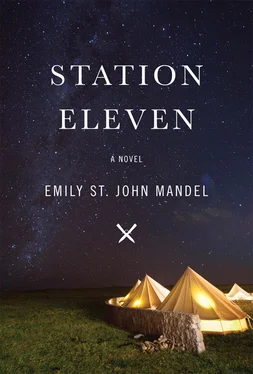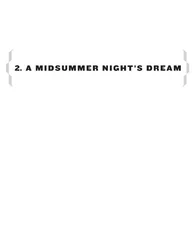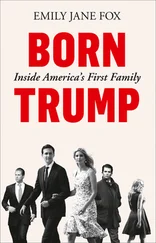“We’ll let it sit for a moment.” The boy turns to his parents and for an instant in the twilight he looks like his namesake, like Jeevan’s brother. He comes to them, the moment already passed, and Jeevan lifts him into his arms to kiss the silk of his hair. Always these memories, barely submerged.
Far to the north, in a place so distant that in this flightless world it might as well be another planet, the caravans of the Traveling Symphony are arriving at the Severn City Airport.
ON HIS LAST MORNINGon earth, Arthur was tired. He’d laid awake until sunrise and then drifted out of a twilight half-sleep in the late morning, sluggish and dehydrated, a throbbing headache behind his eyes. Orange juice would’ve helped, but when he looked in the fridge there was only a mouthful left in the bottom of the carton. Why hadn’t he bought more? He had had insomnia for the past three nights, and his exhaustion was such that this was enough to send him spiraling into something not far from fury, the fury contained with difficulty by breathing deeply and counting to five, soothed by the cold air on his face. He closed the fridge door, made his last breakfast — scrambled eggs — and showered, dressed, combed his hair, left for the theater an hour early so he’d have time to linger with a newspaper over his second-to-last coffee at his favorite coffee place, all of the small details that comprise a morning, a life.
The weather reports had been full of an approaching snowstorm and he sensed it in the air, in the dove-gray weight of the late-morning sky. He’d definitely decided: when Lear closed, he was moving to Israel. The idea was exhilarating. He would shed his obligations and belongings and start over in the same country as his son. He would buy an apartment within walking distance of Elizabeth’s house and he’d see Tyler every day.
“Looks like snow,” the girl in the coffee shop said.
Arthur nodded hello to the hot-dog guy who always stood on the same corner halfway between the hotel and the theater. The hot-dog guy beamed. A pigeon walked in circles near the base of the hot-dog stand, hoping for dropped garnishings and crumbs. The beauty of the pigeon’s luminescent neck.

He arrived at the theater at noon for notes, but the notes devolved into an extended argument and went on well past schedule. Arthur tried to pay attention, but the coffee wasn’t performing as well as he’d hoped. In the late afternoon he lay on a sofa in his dressing room, hoping to revive himself with a nap, but for all his exhaustion the room seemed oppressive. His thoughts raced. He eventually gave up and left the theater. Ignoring the bored photographers outside the stage door, who took pictures and called out questions about Miranda while he waved at passing taxis. Had he dragged her back into the tabloids when she’d visited two weeks ago? He felt the old guilt. She’d never asked for any of it.
“Queen West and Spadina,” he told the driver of an orange-and-green cab, and rested his forehead on the glass to watch their passage down Queen Street. This had been one of his neighborhoods once, but all the shops and cafés he’d known were gone. He was thinking of a diner near Queen West and Spadina, a place he’d frequented with Clark when they were seventeen. He couldn’t recall exactly where it was but he found it eventually, a little farther east than expected.
All these decades later, the place was eerily unchanged. The same line of red upholstered booths, stools down the length of the counter, an ancient clock on the wall. Could this possibly be the same waitress? No, he was misremembering, because the fiftyish woman who’d served him burnt coffee when he was seventeen couldn’t possibly still be fiftyish. He remembered being here with Clark at three or four or sometimes five in the morning, during what seemed at the time like adulthood and seemed in retrospect like a dream. The dream lasted just a moment, but the moment was bright: both of them taking acting classes, Arthur working as a waiter while Clark burned through a small inheritance. Clark had been magnificent, actually, in retrospect. Six foot two and skinny with a penchant for vintage suits, half his hair shaved off and the other half floppy and dyed pink or occasionally turquoise or purple, eye shadow on special occasions, that captivating British boarding-school drawl.
Arthur’s grilled cheese sandwich arrived. He thought of calling Clark, a quick “You’ll never guess where I’m calling from!” moment, but decided against it. He wanted to call his son, but it was four a.m. in Israel.
Arthur finished his dinner and took a cab back to the theater, where there was still a little time remaining. He sat on a sofa in his dressing room and looked over the script — he knew his lines backward and forward, but it was his habit to try to pick up some of everyone else’s lines too, because he liked to know what was coming — but before the end of the first act there was a knock on the door. When he rose the room didn’t spin, exactly, but it wasn’t as steady as it should have been. Tanya brushed past him into the room.
“You look like hell,” she said. “Everything all right?”
“Tired,” Arthur said. “I had insomnia again.” He kissed her, and she perched on one of the sofas. The lightness he felt whenever he saw her. He was captivated, as always, by her excessive youth. She was slightly more than half his age. It was her job to look after the three little actresses who played child versions of Lear’s daughters.
“You forgot you were meeting me for breakfast, didn’t you?”
He slapped a hand to his forehead. “I’m so sorry. I’m not running on all cylinders today. How long did you wait?”
“Half hour.”
“Why didn’t you call me?”
“Dead cell-phone battery,” she said. “It’s okay. You can make it up to me with a glass of wine.” This was something he adored about her, the way she let things go so easily. What a pleasant state of affairs, he’d been thinking lately, to be with a woman who didn’t hold a grudge. He found a half-empty bottle of red in the fridge — she liked it cold — and noticed as he poured her glass that his hands were trembling.
“You really look terrible,” she said. “Are you sure you’re not sick?”
“Just tired, I think.” He liked watching her drink wine, the way she concentrated on the taste. She had the appreciation for nice things that comes only from having grown up with little money.
“Do you have any of those chocolates left?”
“You know, I think I do.”
She smiled at him — the way her smile warmed him! — and set her glass on the coffee table. After a few minutes of rummaging through the cupboard by the sink, she emerged triumphant with a small gold box. He selected a raspberry dark-chocolate truffle.
“What’s this?” she asked, mid-chocolate, picking up Dr. Eleven , Vol. 1, № 1: Station Eleven from the coffee table.
“My ex-wife dropped those off a couple weeks back.”
“Which one?”
He felt a flicker of sadness. This was a sign of having gone seriously astray, wasn’t it? Having more than one ex-wife? He wasn’t sure where exactly he’d gone wrong. “The first one. Miranda. I’m actually not sure what to do with them.”
“What, you’re not keeping these?”
“I don’t read comic books,” Arthur said. “She gave me two copies of each, so I sent the other set to my son.”
“You told me you’re trying to shed your possessions or something, right?”
“Exactly. They’re lovely, but I don’t want more things .”
Читать дальше













